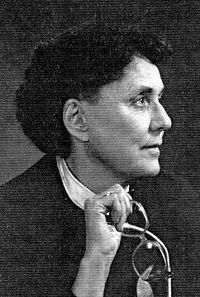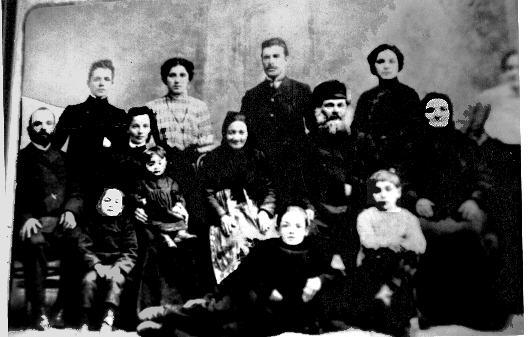Ruth Barcan Marcus
From Wikipedia, the free encyclopedia
Ruth Barcan Marcus (born 1921) is the philosopher and logician after whom the Barcan formula is named. She is a pioneering figure in the quantification of modal logic and the theory of direct reference.
Contents[hide] |
[edit] Biography
[edit] Family
- Barcan Marcus was born in Bronx, New York to Sam and Rose Barcan, Jewish immigrants from Polosk Belarus. Her father Samual Barcan's promising career at the Yiddish Forward and in philanthropy work (Workman's Circle) was cut short by an early death. She was one of three sisters, the others being Hilda and Esther. Other Barcans include her niece Seena Stein, real estate broker for Newmark Corporation and Helmsey in New Jersey, cousin Neil Goldmacher, real estate broker in New York City for Newmark Corporation, Ruben Safir, founder of several Free Software groups, such as NYLXS in New York, David Fishback, prominent government attorney in Washington, DC, Rachel Heiman, anthropologist at The New School in NYC. The Barcan Formula is named for Ruth's family name and a partial tribute to her father and family roots.
[edit] Education
- B.A., New York University (1941)
- M.A., Yale University (1942)
- Ph.D., Yale University (1946)
[edit] Academic appointments
- Professor of philosophy and founding department chair, University of Illinois at Chicago (1962-1970)
- Professor of philosophy, Northwestern University (1970-1973)
- Halleck professor of philosophy, Yale University (1973-1991)
- Professor emerita and senior research scholar, Yale University 1992-); Visiting distinguished professor, University of California, Irvine (one quarter each year, 1992-97)
[edit] Professional offices and service (partial list)
- Chair of the Board of Officers, American Philosophical Association (1977-83)
- President, Association for Symbolic Logic (1983-86)
- President, International Institut de Philosophie (1989-92) and Presidente Honoraire (continuing)
[edit] Philosophy
[edit] Quantified Modal Logic
Ruth Barcan Marcus' earliest published work was the publication of the first axiomatic study of modal logic with quantifiers. These three ground-breaking articles were "A Functional Calculus of First Order Based on Strict Implication", Journal of Symbolic Logical (JSL, 1946), "The Deduction Theorem in a Functional Calculus of First Order Based on Strict Implication" (JSL, 1946), "The Identity of Individuals in a Strict Functional Calculus of Second Order," (JSL, 1947). The three articles are published under Marcus' maiden name: Ruth C. Barcan. These papers of of 1946 and 1947 , were the the first systems of quantified modal logic, which Marcus abbreviated "QML". QML extended some propositional modal systems of Clarence Irving Lewis to higher order, a major accomplishment in the development of 20th century logic. Lewis gives Marcus special recognition in his "Notes on the Logic of Intension, originally printed in Structure, Method, and Meaning: Essays in Honor of Henry M. Sheffer (New York, 1951). Here Lewis recognizes Barcan Marcus as the first logician to extend propositional logic as a higher order intensional logic.
[edit] Direct Reference
Ruth Barcan Marcus proposed what came to be called the theory of "direct reference", a view in the philosophy of language according to which proper names are what Marcus termed mere "tags". ("Modalities and Intentional Languages" (Synthese, 1961)(and elsewhere). These "tags" are used to refer to an object (the bearer of the name). The meaning of the name is regarded as exhausted by this referential function. This view contrasts for example with late Bertrand Russell description theory of proper names as well as John Searle's cluster description theory of names which prevailed at the time.
[edit] Necessity of Identity
The necessity of identity was formally proved in 1946 and informally argued for in 1961 and thereafter thus rejecting the possibility of contingent identity.
[edit] Semantics of QML
Marcus prefers an interpretation where the domain of the interpretation comprises individual entities in the actual world. She also suggests that for some uses an alternative substitutional semantics is warranted (See below). She provides arguments against possibilia. See "Dispensing with Possibilia" (Proceedings of the American Philosphical Association, 1975-76); "Possibilia and Possible Worlds" (Grazer Philosopherische Studien, 1985-86). T
[edit] Moral Conflict
Marcus defines a consistent set of moral principles as one in which there is some "possible world " in which they are all obeyable. That they may conflict in the actual world is not a mark of inconsistency. As in the case of necessity of identity, there was a resistance to this interpretation of moral conflict. Her argument counts against a widely received view that systems of moral rules are inevitably inconsistent. See "Moral Dilemmas and Consistency" (Journal of Philosophy, 1980)(and frequently published elsewhere).
[edit] Belief
It is proposed that believing is a relationship of an agent to a possible state of affairs under specified internal and external circumstances. Assenting to a quoted sentence (the disquotation account of belief) is only one behavioral marker of believing. Betting behavior is another. The wholly language centered account of belief (e.g. Davidson) is rejected. Where an agent behaves as if an impossibility obtained Marcus proposes that under those circumstances the agent, on the disclosure of the impossibility should say that she only claimed to believe an impossibility. In much the same way, when a mathamatecian discovers that one of his conjectures is false, and since if it is mathetatically false it is impossible, he would say he only claimed to believe it. Odd as this proposal is, it is analogous to the widely accepted principle about knowing: if we claim to know P, and P turns out false, we do not say we we used to know it, we say we were mistaken in so claiming. See "A Proposed Solution to The Puzzle About Belief" (Foundations of Analytic Philosophy in Midwest Studies, 1981) and "Rationality and Believing the Impossible" (The Journal of Philosophy, 1983 and elsewhere).
[edit] Essentialism
Aristotelian Essentialism is concerned with properties which Marcus defines in the context of a modal framework. One proposal is that a property is essential if something has it, not everything has it, if something has it then it has it necessarily, and it is not wholly individuating e.g. a natural kind property. It is incorrectly claimed by Quine and others that modal logic or semantics is committed to essentialist truths. Marcus argues informally that there are interpretations of some modal systems in which all essentialist claims are false. This result was later formally proved by Terence Parsons, Philosophical Review, 78 (1969).
[edit] Substitutional Quantification
An alternative to Tarskian (model theoretic)semantics is proposed for some uses where "the truth conditions for quantified formuli are given purely in terms of truth with no appeal to domains of interpretation". (Later called by others "truth value semantics". She shows that the claim that such a semantics leads to contradictions is false.) Such a semantics may be of interest for mathematics e.g. Hartrey Field, or for fictional discourse. Objectual quantification is required for interpretation of identity and other metaphysical categories.
[edit] Awards and recognitions
- Guggenheim Fellow (l952)
- National Science Foundation Fellow (1963)
- Rockefeller Foundation Residency (Bellagio, 1973 and 1990)
- Center for Advanced Study in the Behavioral Sciences (l979)
- University of Edinburgh Fellow, Humanities Institute (1983)
- Wolfson College of Oxford University, Visiting Fellow (1985 and 1986)
- Clare Hall of Cambridge University, Visiting Fellow (1988)
- National Humanities Center , Mellon Fellow (1992-93)
- Fellow, American Academy of Arts and Sciences(1977--)
- Medal of the College de France (1986)
- Doctor of Humane Letters, honoris causa, University of Illinois at Chicago (1995)
- Wilbur Cross Medal, Yale university (2000)
- Lauener Prize in Analytic Philosophy, Lauener Foundation, 2007-08.
- Permanent Member of the Common Room, Clare Hall (1986-)
- Phi Beta Kappa (1941)
- Membre, Institut International de Philosophie, 1989-92 President Honoraire 1992-
[edit] Books (written or edited)
- The Logical Enterprise, ed. with A. Anderson, R. Martin, Yale, 1995
- Logic, Methodology and Philosophy of Science, VII, eds. R. Barcan Marcus et al., North Holland, 1986
- Modalities: Philosophical Essays, Oxford University Press, 1993. Paperback; 1995 (contains many of Marcus's important papers)
[edit] External links
Categories: 1921 births | Living people | 20th century philosophers | 21st century philosophers | Academics | American educators | American philosophers | Philosophers of language | American Jews | Jewish philosophers | Analytic philosophers | Logicians | Yale University alumni | Yale University faculty | Fellows of Wolfson College, Oxford



